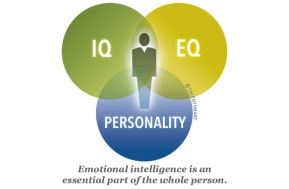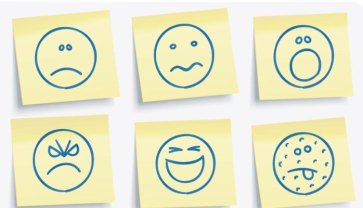- Have you ever decided not to hire someone because “something just didn’t feel right”?
- Would you ask your boss for more resources when the boss is having “a bad day”
- Do you take a different approach when dealing with a disgruntled customer?
- How might you help motivate an under-performing team member to succeed?
“In the last decade or so, science has discovered a tremendous amount about the role emotions play in our lives. Researchers have found that even more than IQ, your emotional awareness and abilities to handle feelings will determine your success and happiness in all walks of life…” – John Gottman
Emotional Intelligence involves a set of skills that define how effectively you perceive, understand, reason with and manage your own and others’ feelings. These skills are important at work as emotions are an inherent part of workplace activities at all levels.

Research studies suggest that Emotional Intelligence makes a difference in the workplace, including: productivity and performance, interpersonal effectiveness leadership capability sales performance teamwork, customer service, and job satisfaction.
The emotions you experience at work also influence the behaviors you display to others, contributing to: tone of voice, body language, and facial expressions.

The word is out about emotional intelligence. Companies who once focused only on where their new hires went to college have learned that IQ alone isn’t going to make them successful. The way they conduct themselves, the way they express themselves, and the way they interact with others are all as important if not more important than the person’s score on an intelligence test.
Companies have realized that IQ alone cannot predict an individual’s performance or success.
When an individual has not developed their EI, they tend to get stopped by setbacks. They either can’t get past these kinds of situations, or they struggle past it after a long period of time. They may react negatively to the other people involved, which results in increased animosity and difficulty in being productive. They may take things personally that are not meant to be. They may feel like a victim rather than feeling empowered. All in all, these types of situations prevent them from being as successful as possible in the workplace.
Someone who has a highly developed EI still face these types of situations, just like everyone else. Yet the way they react is different. They are able to stop and analyze what they are feeling, and to understand how those feelings are impacting their behavior and their choices. They are able to recognize how other people are feeling and to empathize with them.
They can then choose the behavior and actions that will help them to not just move past a situation, but to resolve it – both within themselves and in relationship to others. And as they practice, they will get faster and faster at recovering from stumbling blocks. At their most emotionally intelligent, they can see setbacks as learning experiences and chances to improve their relationships with others. Then these roadblocks no longer stop them, but rather help them develop their potential.
Now imagine a workplace full of employees with highly developed EI !!!
The researchers discovered that those sales people who showed high levels of optimism sold 37 percent more insurance that the pessimists in the first two years on the job. Furthermore, the company hired a group of new sales people who failed the normal job screening tests but tested high on the optimism scale. They sold 21 percent more insurance in their first year on the job and 57 percent more during their second year on the job. Clearly, emotional intelligence in the form of optimism was more important in predicting performance than the traditional ‘intelligence’ tests the company had been using.
Similar results were found at L’Oreal. Compared to the company’s traditional job selection process, the use of EI competency tests resulted in hiring salespeople who sold an average of over $90,000 more than other salespeople. The annual result? Over $2.5 million in increased revenue. But that’s not all – those hired for their EI were 63 percent less likely to leave in the first year than salespeople selected in the traditional method.
For more details and free resources on Leadership, Coaching & Sales, please write to: training@lcbsdhaka.com.
